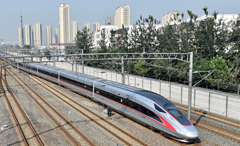China’s economy on firm footing, stronger growth driver for world: communique
2018-02-28
Xinhua
BEIJING —The National Bureau of Statistics (NBS) on Feb 28 released a communique on economic and social development in 2017, focusing on China’s firm economic fundamentals and its contribution to world economic growth.
The communique highlighted sound economic growth, greater overall national strength and international influence, better quality growth, and new growth drivers, said NBS chief statistician Sheng Laiyun.
Solid efforts have also been made in environmental protection and energy saving, Belt and Road construction, opening up, poverty relief, and general improvement in quality of life, Sheng said. The communique showed China’s contribution to world economic growth stood at around 30 percent in 2017.
“Chinese economy remained an important growth engine for the world’s economic recovery,” said Sheng.
World Bank data showed that China contributed 34 percent of world economic growth from 2012 to 2016, more than that of the United States, EU and Japan combined.
China’s economy expanded 6.9 percent last year, picking up for the first time in seven years and well above the government target of around 6.5 percent.
The performance not only fuelled optimism for a global recovery, but secured greater sustainability through domestic consumption, trade and new technology, which increased external demand and international productivity.
Sheng stressed that China can maintain sound economic growth in 2018 through continued reform and opening up. Indeed, as reform and opening up enters its 40th year, the policy is of even greater importance in a new era of high-quality development.
Reform and opening up is the very reason behind China’s growth and will remain the key driving force of high-quality development, said Sheng.
China’s social and economic development in 2017 in numbers:
Gross domestic product (GDP) expanded 6.9 percent to 82.7 trillion yuan ($12.8 trillion), around 15 percent of the world total.
Foreign exchange reserves, the world’s largest, reached 3.1 trillion dollars.
Grain output stood at about 618 million tonnes.
A total of 13.5 million new urban jobs were created. Registered urban unemployment fell to 3.9 percent, the lowest since 2002.
Consumer prices rose by 1.6 percent, well within the government target.
Industrial capacity utilization hit 77 percent, the highest in five years.
The area of unsold commercial buildings decreased by 106 million square meters.
Profits of industrial companies with annual revenue over 20 million yuan rose 21 percent, 12.5 percentage points faster than in 2016.
The service sector expanded 8 percent to account for 51.6 percent of GDP.
Increased consumption contributed 58.8 percent to GDP growth.
An average of 16,600 new companies were registered each day.
Clean energy, including natural gas, wind and nuclear power, accounted for 20.8 percent of total energy consumption, up 1.3 percentage points.
Trade with countries along the Belt and Road rose 17.8 percent to 7.4 trillion yuan.
Per capita disposable incomes grew 7.3 percent.
The number of rural people living below the poverty line was reduced by 12.9 million to 30.5 million.


